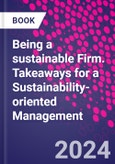Being a Sustainable Firm: Takeaways for a Sustainability-Oriented Management addresses the key strategic issues that firms encounter when entering the complex world of sustainability. Faced with a proliferation of approaches, regulations and procedures, the text outlines the contours of the meaning of being a sustainable firm and provides a theoretical framework within which to place the environmental, social and governance (ESG) strategic decisions.
The volume critically retraces the way in which companies approach sustainability starting from the EU SDG goals content and the set of indicators for sustainable business. It pays particular attention to SDG 9: Industry, Innovation and Infrastructure, SDG 11: Sustainable Cities and Communities, and SDG 12: Ensure Sustainable Consumption and Production Patterns for their interrelationships and implications on the firm competitiveness and the development of cities of the future. In addition, it unfolds across the broad spectrum of international standards and sustainability reporting guidelines, as relevant voluntary socio-environmental reporting systems recognized at international level. Understanding the logic of sustainability reporting and applying sustainable reporting models to specific business areas offers critical insights and application tools for organizations committed to integrating sustainability into their business and creating new sources of value starting from a common vision of sustainable development and social responsibility. The book highlights these aspects by linking them to the firm challenges and sustainability models in sectors particularly interested in sustainable development, including fashion, tourism, and public-private partnerships for sustainable local communities.
The book provides useful support for students and scholars of managerial disciplines, interested in the topics of innovation management, sustainability-based strategies, sustainable entrepreneurship, socio-environmental reporting systems and performance evaluation. The delineation of the regulatory framework and sustainability reporting standards within which strategic decisions are placed constitutes a valuable guide for consultants and entrepreneurs interested to deepen the state of the art of the tools connected to corporate sustainability management and provides takeaways for managers and practitioners on sustainable practices implementation and reporting of activities.
Please Note: This is an On Demand product, delivery may take up to 11 working days after payment has been received.
Table of Contents
1. Sustainability: meaning and boundaries
2. Selecting EU SDG goals for sustainable business
3. Critical issues in the sustainability assessment
4. Regulatory standards and guidelines for sustainability
5. Strategies for sustainable innovations in fashion firms
6. Sustainable business models in the hospitality sector
7. Building smart cities and inclusive local communities
8. EU SDG indicators: implications and interconnections on the sustainability management
Authors
Maria Cristina Longo Department of Educational Science, Department of Economics and Business, University of Catania, Italy.Cristina Longo is an Associate Professor of Business Economics and Management at the University of Catania where she teaches Innovation Management, Tourism Management, and Principles of Management. She was a Canon Foundation in Europe 2021 Research Fellow at Institute Advanced Studies (IAS) and Graduate School of Environment, Yokohama National University, Japan. Her research interests focus on the topics of innovation management, entrepreneurship, and strategy.
Eleonora Cardillo Department of Economics and Business, University of Catania, Italy.Eleonora Cardillo is an Associate Professor of Accounting at the Department of Economics and Business of the University of Catania, where she teaches Financial Accounting and Public Accounting. She was a visiting scholar at the Centre for Social and Environmental Accounting Research, School of Management-University of St. Andrews. Her research interests regard public accounting systems, performance evaluation, sustainability, and social reporting.








